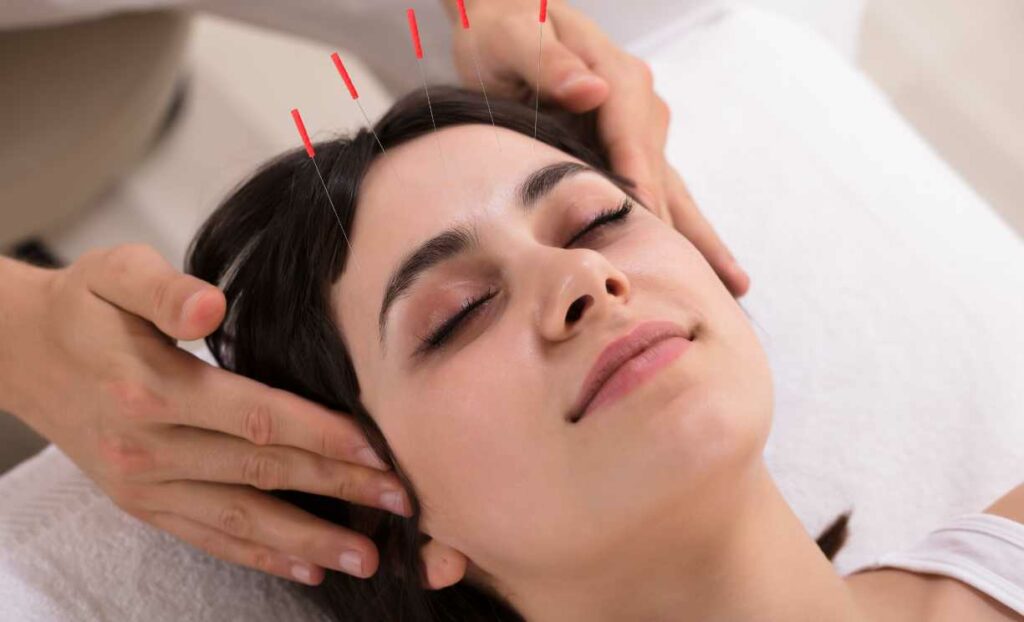Polycystic Ovarian Syndrome (PCOS) is a complex hormonal disorder that affects many aspects of a woman’s health, from fertility to metabolic well-being. While conventional treatments are often recommended, an increasing number of individuals are exploring complementary therapies like acupuncture to manage polycystic ovarian syndrome symptoms. In this blog, we delve into the ancient art of acupuncture and its potential role in offering relief for those navigating the challenges of polycystic ovarian syndrome.
Contents
Understanding PCOS
Polycystic Ovarian Syndrome (PCOS) is a common hormonal disorder that affects people assigned female at birth. In simple terms, it’s a condition where the ovaries, which produce eggs, function irregularly. Normally, the ovaries release an egg each month, but in PCOS, this does not happen. Instead of releasing eggs regularly, the ovaries might develop small, fluid-filled sacs called cysts. These cysts can lead to hormonal imbalances, causing symptoms like irregular periods, acne, and excess hair growth.
PCOS is often associated with difficulties in getting pregnant and may also include an increased risk of diabetes and heart issues. While there’s no cure for PCOS, various treatments and lifestyle changes can help manage its symptoms. Regular check-ups with healthcare providers are crucial for those with PCOS to monitor and address its unique challenges.
Symptoms Of PCOS
Polycystic Ovarian Syndrome (PCOS) is a hormonal disorder that can manifest through a variety of symptoms. It’s important to note that not everyone with PCOS will experience the same symptoms, and the severity can vary. Here are some common symptoms associated with PCOS:
- Irregular Menstrual Cycles: One of the hallmark signs of PCOS is irregular periods. This can include infrequent menstruation, unpredictable cycle lengths, or prolonged periods.
- Ovulatory Dysfunction: PCOS often disrupts normal ovulation, leading to fertility challenges. Some individuals with PCOS may experience anovulation as well.
- Ovarian Cysts: The condition is characterized by the presence of small, fluid-filled sacs (cysts) on the ovaries. These cysts can contribute to hormonal imbalances.
- Hyperandrogenism: Elevated levels of androgens (male hormones) can lead to symptoms such as acne, oily skin, and excessive hair growth (hirsutism), particularly in areas where men typically grow hair, like the face and chest.
- Hair Thinning: While some individuals with PCOS experience excessive hair growth, others may notice thinning of the hair on the scalp, a condition known as androgenic alopecia.
- Weight Fluctuations: PCOS is often associated with weight-related issues, including difficulty losing weight and a tendency to gain weight, especially around the abdominal area.
- Insulin Resistance: Many individuals with PCOS have insulin resistance, which can contribute to difficulties in managing blood sugar levels and an increased risk of type 2 diabetes.
- Skin Changes: Skin issues, such as darkening of the skin in certain areas (acanthosis nigricans), may occur in individuals with insulin resistance.
- Mood Changes: Some individuals with PCOS may experience mood swings, anxiety, or depression. Hormonal fluctuations and the emotional impact of fertility challenges can contribute to these symptoms.
- Pelvic Pain: Pelvic pain or discomfort may be present, especially if ovarian cysts become enlarged or if there is pressure on surrounding organs.
How Acupuncture Works
Acupuncture operates on the principles of Traditional Chinese Medicine, offering a unique perspective on the body’s energy flow or Qi. The practice involves inserting thin, sterile needles into specific points on the body, known as acupuncture points. These points are believed to be situated along pathways called meridians, through which Qi flows.
The goal of acupuncture is to stimulate and balance the flow of Qi, addressing any disruptions or imbalances. For conditions like Polycystic Ovarian Syndrome (PCOS), acupuncture aims to regulate the body’s hormonal systems, enhance blood circulation to organs like the ovaries, and reduce stress, which can play a role in exacerbating PCOS symptoms.
The needles used in acupuncture are extremely thin and generally cause minimal discomfort. The process triggers the body’s natural healing responses, promoting overall well-being and harmony. While the scientific understanding of acupuncture is still evolving, many individuals report positive outcomes.
Benefits Of Acupuncture For PCOS
Acupuncture offers various benefits in managing PCOS, and a holistic approach to address complex hormonal imbalances. Here are some potential benefits of acupuncture for individuals with PCOS:
- Hormonal Regulation: Acupuncture is believed to influence the endocrine system, helping to regulate hormones such as insulin, cortisol, and sex hormones. This can contribute to improved menstrual regularity and ovulatory function.
- Improved Ovulatory Function: By promoting better blood circulation to the ovaries and regulating hormonal balance, acupuncture may enhance ovulatory function. This is crucial for those with PCOS who often experience irregular or absent ovulation.
- Reduced Insulin Resistance: Some studies suggest that acupuncture may have positive effects on insulin sensitivity, potentially helping to manage insulin resistance, a common feature of PCOS.
- Stress Reduction: Chronic stress can exacerbate PCOS symptoms. Acupuncture has demonstrated stress-reducing effects, promoting relaxation and potentially mitigating stress-related hormonal imbalances.
- Enhanced Blood Circulation to Ovaries: Acupuncture is believed to improve blood flow to the ovaries, creating a more conducive environment for proper ovarian function. This may reduce the formation of cysts.
- Menstrual Regularity: One of the primary benefits reported by individuals with PCOS undergoing acupuncture is improved menstrual regularity. Acupuncture aims to regulate the menstrual cycle, reducing the frequency of irregular periods.
- Individualized Treatment: Acupuncture is highly individualized, with practitioners tailoring treatment plans based on the unique symptoms and health goals of each person. This personalized approach ensures that acupuncture addresses the specific needs of individuals with PCOS.
- Few Side Effects: Acupuncture is generally well-tolerated with minimal side effects. Compared to some pharmaceutical interventions, acupuncture offers a natural and low-risk option for managing PCOS symptoms.
Natural Ways To Manage PCOS
PCOS is a hormonal disorder that affects women and often leads to irregular periods, cysts, and symptoms like acne, weight gain, and infertility. While medical interventions are available, some people opt for natural approaches to manage PCOS symptoms. Here are some natural ways to address PCOS:
- Healthy Diet:
- Low-Glycemic Foods: Focus on a diet rich in low-glycemic foods like whole grains, fruits, vegetables, and lean proteins. This can help manage insulin levels, as insulin resistance is common in PCOS.
- Balanced Macronutrients: Ensure a balanced intake of carbohydrates, proteins, and healthy fats to support overall health and hormone regulation.
- Regular Exercise: Engage in regular physical activity, as exercise helps improve insulin sensitivity and can aid in weight management, a key factor in PCOS.
- Maintain a Healthy Weight: Achieving and maintaining a healthy weight can positively impact PCOS symptoms. Even a modest weight loss can contribute to improved hormonal balance.
- Stay Hydrated: Drinking plenty of water supports overall health and can assist in managing weight, potentially alleviating some PCOS symptoms.
- Omega-3 Fatty Acids: Incorporate sources of omega-3 fatty acids, such as fish oil or flaxseed, into your diet. Omega-3s have anti-inflammatory properties and may contribute to hormonal balance.
- Manage Stress: Chronic stress can exacerbate PCOS symptoms. Incorporate stress-reducing activities like yoga, meditation, or deep breathing exercises into your routine.
- Cinnamon Supplements: Some studies suggest that cinnamon supplements may help improve insulin sensitivity in individuals with PCOS.
- Regular Sleep Patterns: Establish consistent sleep patterns, as inadequate sleep and irregular sleep cycles can disrupt hormonal balance.
- Vitamin D Supplementation: Some individuals with PCOS may have low vitamin D levels. Consult with a healthcare professional about appropriate supplementation.
Can Acupuncture Help With Fertility?
Certainly! Acupuncture can aid fertility by promoting hormonal balance and improving blood flow to reproductive organs. The practice involves inserting thin needles into specific points on the body, stimulating the release of hormones that play a crucial role in the reproductive process. By enhancing blood circulation to the ovaries and uterus, acupuncture may create a more favorable environment for egg maturation and implantation. Additionally, acupuncture also helps reduce stress, which can be particularly beneficial for couples facing fertility challenges. While not a guaranteed solution, many individuals find acupuncture to be a supportive and holistic approach to complement conventional fertility treatments, potentially increasing their chances of conception. Always consult with a healthcare professional to determine the most suitable approach for your unique situation.
Conclusion
In conclusion, exploring the potential benefits of acupuncture for polycystic ovarian syndrome offers individuals seeking holistic approaches to manage their symptoms. While conventional treatments play a crucial role in polycystic ovarian syndrome management, acupuncture offers a unique perspective by addressing the body’s energy flow and promoting balance.
As with any medical approach, it’s essential to consult with healthcare professionals, integrating acupuncture as a thoughtful complement to existing treatments, and tailoring a comprehensive strategy that aligns with individual health needs.





